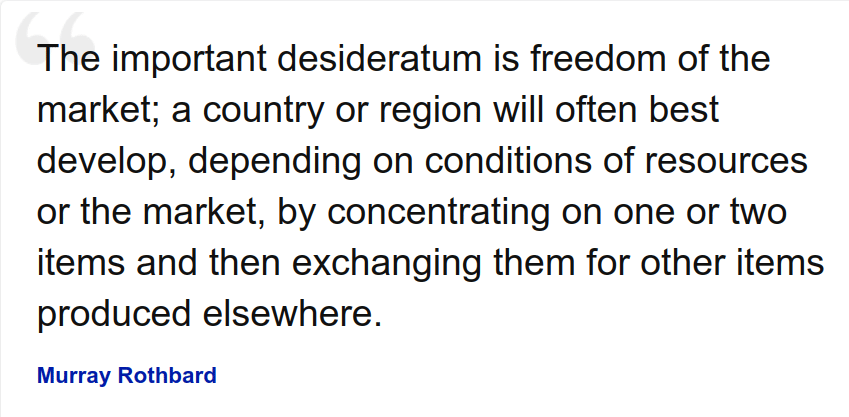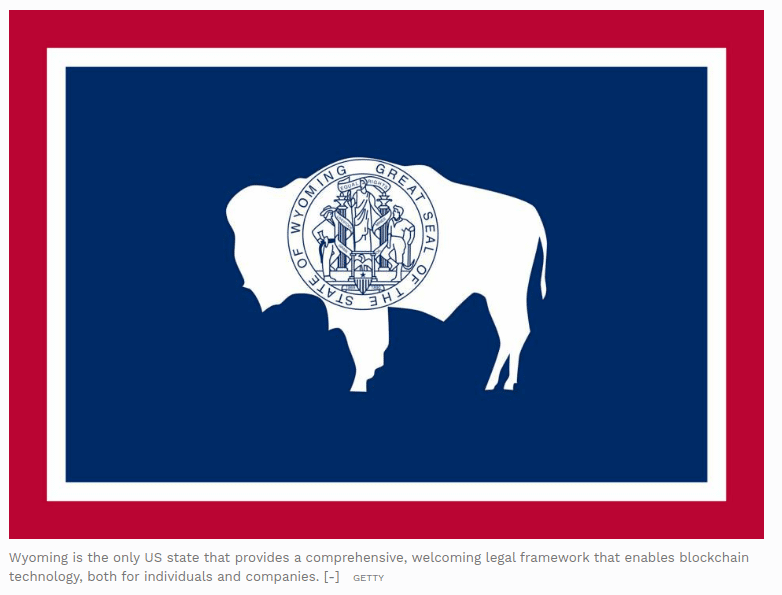Wyoming is leading the country in creating an innovative blockchain legal framework. Caitlin Long (follow her on twitter) has been a leader in this effort but not the only one – this year Cynthia Lummis was elected to the senate from Wyoming. She is a strong advocate of crypto and blockchain technology and has already teamed up with other senators and members of congress to oppose the new rules pushed by Steve Mnuchin targeted at self-hosted crypto wallets. There is even a new congressional blockchain caucus. While the federal government is debating ways to regulate cryptocurrencies (they hate competition), states are enacting crypto friendly laws which will help spread crypto use to more people. Much like the legalization of marijuana, the innovation is coming at the state level and, as usual, the federal government is fighting the last war – they will fight this, but they will lose. The momentum in crypto has reached the point where they can’t stop it. Libertarians should rejoice – this is the revolution: property rights, individual sovereignty and money free of central bank manipulation.
“In sum, Wyoming is already the “Delaware of digital asset law,” a reference to Delaware’s lead in corporate law. More than a dozen other US states and Congress are now following Wyoming’s lead by enacting our bills (usually just one or two of Wyoming’s bills). But no other state is likely to catch up to Wyoming—it’s a very tall order for any legislature to enact 13 bills on a single topic in a compressed time frame, especially when another state has already claimed first-mover advantage.
Here are the top highlights regarding Wyoming’s newest blockchain laws:
- Recognizes direct property rights for individual owners of digital assets of all types (virtual currencies, digital securities and utility tokens) and applies the super-negotiability rules of commercial law to virtual currencies—which foster their liquidity—by applying the very same rules that apply to money. Wyoming’s commercial law reflects the true nature of digital assets (directly owned, peer-to-peer assets), and I strongly encourage other states to adopt Wyoming’s same commercial law protections;
- Creates a fintech sandbox to provide regulatory relief to financial innovators from existing laws for up to 3 years. It’s broadly reciprocal with fintech sandboxes both in the US and globally;
- Authorizes a new type of state-chartered depository institution to provide basic banking services to blockchain and other businesses. The bank is required to have 100% reserves, cannot lend, is for business depositors only, and FDIC insurance is optional. Such banks could be operating as soon as March 31, 2020;
- Authorizes the first true “qualified custodian” for digital assets which is a bank. Wyoming banks can start such operations as soon as September 1, 2019. Wyoming’s digital asset custodians will stand out above all others because they will respect the DIRECT ownership nature of digital assets! These new custodians won’t be like traditional securities custodians, because for a Wyoming-based custodian investors will still DIRECTLY own their digital assets under custody as a BAILMENT, which means they retain direct ownership while merely giving up control (much like valet parking). Today, institutional investors are forced to be de facto creditors of their securities custodians, since all publicly-traded securities are owned indirectly. Custody under bailment is possible in securities custody today, but it’s neutered by the fact that all securities are owned indirectly—investors can’t directly own the real security, and therefore they’re really just counterparties to the custodian. So, what Wyoming has done is truly revolutionary—BAILMENT + DIRECT ownership! It doesn’t exist in securities custody today! Customers of Wyoming custodians can still choose indirect ownership, but it’s on much more investor-friendly terms than exist in securities custody today. In sum, Wyoming will become known as the home of SOLVENT, investor-friendly digital asset custodians to which investment fiduciaries are likely to migrate over time.
Why would a staunch supporter of #NotYourKeysNotYourCoins, as I am, help set up a digital asset custodian—especially when I acknowledge all third parties can be security holes? Answer: the custodian is for large institutional investors, which are required by federal securities law to store the assets they manage at an independent custodian. And, now, these institutional investors will be able to directly own the digital assets they custody at solvent Wyoming custodians.
Capital ultimately flows to where it’s treated best. For digital assets within the US, I’m pretty confident that will end up being Wyoming. It’s all about its legal regime respecting DIRECT ownership of digital assets, whether by individuals or institutional investors. I was formerly a fiduciary of pension plans and, based on that experience, I think it will become a very big deal that provably SOLVENT custodians exist. As more and more securities are natively-issued on blockchains in the next several years, Wyoming’s custodians will likely become the preferred digital-asset custodians of 401(k) plans and mutual funds—and they will help make securities markets fair to regular investors!
Individuals and business owners also benefit from Wyoming’s crypto friendly laws:
Yes, a lot. Wyoming’s money transmitter law exempts crypto-to-crypto transactions, effective as of last year. Many lawyers worry that Lightning Network transactions may run afoul of money transmitter laws. Well, not in Wyoming (#probably!—check with your lawyer!) At least three other states that I know of have either enacted, or are in process of enacting, Wyoming’s same money transmitter exemption for crypto-to-crypto transactions.
If you’re working on security tokens, you won’t find a friendlier state because Wyoming law legally recognizes both uncertificated and certificated blockchain shares of stock. Delaware was first to recognize blockchain shares, but it only recognizes uncertificated versions. Wyoming’s new law regarding certificated shares just took effect this week, and WOW, Missouri was lightning fast in already copying it! Imitation is the sincerest form of flattery!
Wyoming was the first state to exempt utility tokens from its state securities laws, which took effect last year. State law doesn’t trump federal laws regarding securities, but I’m pleased that Arizona also enacted a similar law last year and five other states have proposed it this year. Wyoming’s law also heavily influenced the proposed federal Token Taxonomy Act in Congress. It’s really true that the impetus to change bad federal law sometimes bubbles up from the states—and 7 states supporting a common cause is actually a lot, just one year into the effort—it’s already a “movement” to push back against the SEC’s view that most digital assets are securities.
And Wyoming added a couple of sweeteners to attract cryptocurrency miners to Wyoming as well.
One bill enables Wyoming’s electric utilities to negotiate directly with miners, instead of requiring them to go through the ratemaking process. All gains and losses from mining agreements remain with the utility’s shareholders, thereby completely insulating retail electric customers from these transactions.
As for federal tax relief, Wyoming can’t fix the IRS’s terrible tax treatment of digital assets (yes, spending bitcoin on a cup of coffee triggers federal capital gains tax). But there are 25 opportunity zones located around Wyoming that provide potential capital gains tax deferral—again, talk to your tax adviser. Some of these locations might be great spots for cold-storage vaults, mining operations and/or the new headquarters of your start-up or investment fund.”
more here































